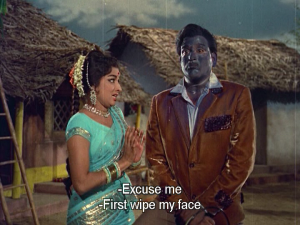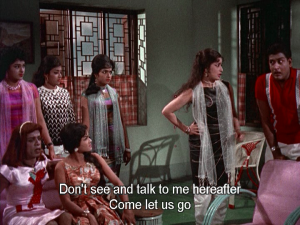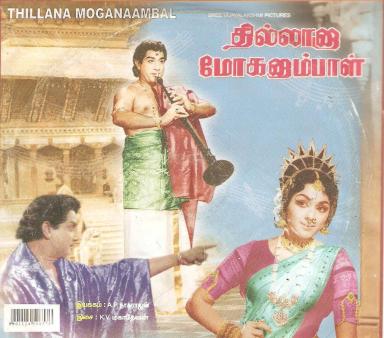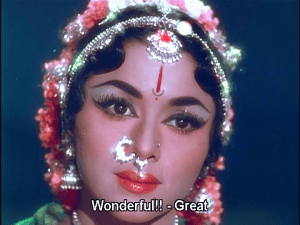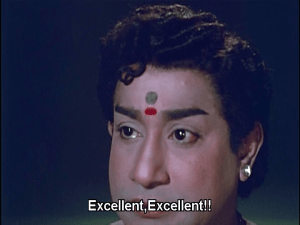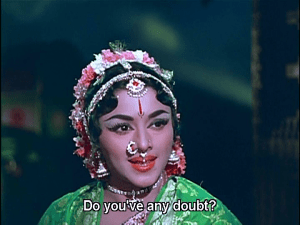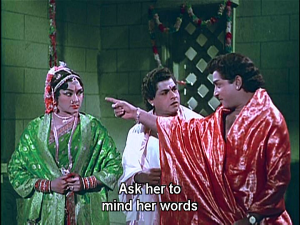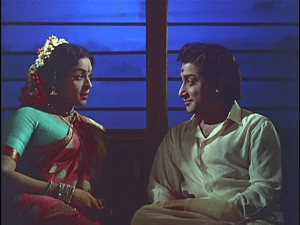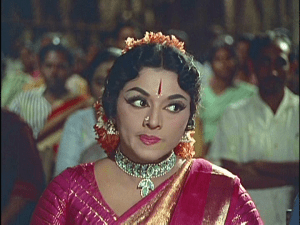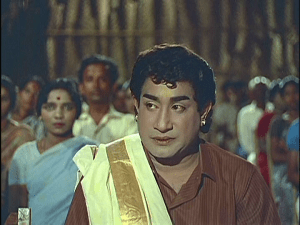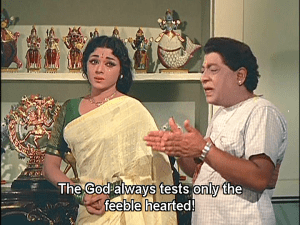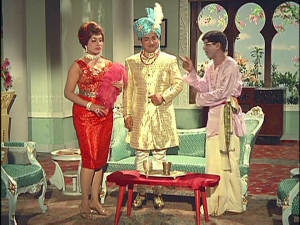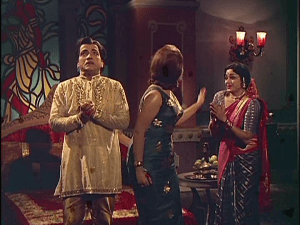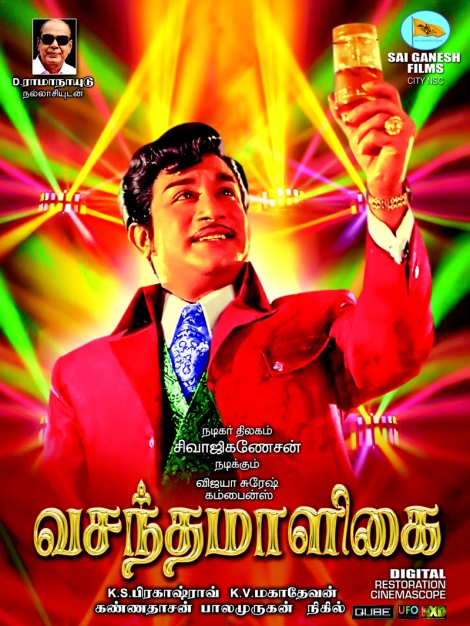
It’s been a while since I watched some seventies masala, and what better way to indulge than K.S. Prakash Rao’s wonderfully dramatic Vasantha Maligai. Sivaji Ganesan and Vanisri star in this adaptation of Koduri Kausalya Devi’s novel about a rich prince and his romance with a middle class woman working to support her family. Like all good masala films there is a dash of everything – romance, tragedy, filmi medicine, an evil overlord, oppressed villagers and even a comedy cook, but it’s the performances from the cast along with some beautiful songs that make Vasantha Maligai well worth a watch.
Anand (Sivaji Ganesan) is the alcoholic younger son of a royal family and the film opens with a song detailing his drunken antics on a plane where Latha (Vanisri) is working as an air hostess. The opening scenes focus on Anand with Latha merely a figure in the background concerned about fastening seatbelts when the plane hits turbulence, so it’s a surprise when the next scene shows Latha returning home to her family and attention moves to her situation. I like this way of building anticipation for the next meeting between the two, while providing the back story that establishes Latha’s character.
Latha is the main wage earner in the family as her brother (Sreekanth) is a wastrel and her father (Major Sundarrajan) is crippled from an accident. Her mother (Pandari Bai) is unhappy about Latha’s job and persuades her to look for something safer where she doesn’t have to risk life and limb in an aeroplane every day. However, Latha’s subsequent venture into employment turns out to be much more dangerous than her work as an air hostess and Anand returns to the story when he rescues Latha from her amorous new boss. Anand just happens to be grooving the night away in the same hotel celebrating his birthday party, and our hero is such a style icon that he even takes time during the ensuing fight scene to fix up his hair – such panache!
Despite his drunkenness and playboy appearance, Latha accepts a job as Anand’s personal secretary where her kind heart and overall decency start to have an effect on his behaviour. However Latha is also proud and her self-esteem leads her to appear arrogant, particularly when she clashes with Anand’s servant and drinking buddy Panchavarnam (Nagesh). Nagesh is determined to keep Anand drinking to ensure his own supply of grog, while Latha is equally determined to wean Anand off the demon drink and make him a useful member of society. In the end it’s Latha’s concern for his well being that starts to win Anand over but it’s not until he injures Latha during one of his drinking binges that he finally starts to mend his ways.
While Anand is intent on drinking himself into an early grave, his elder brother Vijay (K. Balaji) terrorises the local villagers who work on the estate. Vijay is a nasty piece of work and Balaji has a great demonic laugh and seems to be thoroughly enjoying his role as a brutal despot. His wife Vimala is equally evil and plots to get rid of Latha before she can redeem Anand, although whether this is to keep her husband in control of the estate or just because she is a horrible person is hard to decide. I’m not sure who the actress is playing Vimala but she has a great sneer and is wonderfully condescending in her attitude to just about everyone else although she does seem to care for her husband and child.
Her concern is valid since Anand secretly builds a wonderful palace for the woman he adores, although he refuses to name her until the building is complete – no surprises for who his secret love is, although he does win marks for the way he finally reveals his love.
I know tastes were different back in the seventies but even then surely this would be considered over the top pastel décor:
There are endless ornate pillars, arches, and latticework with tacky silver statues practically everywhere. The indoor pool has giant lotus flower fountains, and the room where Anand reveals the face of his true love is full of mirrors (expected) and revolving pillars (totally unexpected) that don’t seem to have any purpose whatsoever. And what else will they ever use this room for? Latha however is enraptured by the palace and the discovery that Anand loves her, ending up leaping through the gardens in true masala romance style in the gorgeous song Mayakkam Enna.
However there is still a long way to go before the end and Vimala and Vijay manage to turn Ananad against Latha, ultimately resulting in Anand becoming very ill. According to his doctor his cough and general malaise are caused by his sudden drop in alcohol consumption, and no-one ever mentions his chain smoking habit as a possible issue. Aah – the seventies – life was so much simpler back then – unless you were the heroine in a masala movie of course. Poor Latha has many more trials and setbacks to endure before true love wins out, and she has plenty of opportunity to practice her emoting skills while enduring gallons of fake tears. Although she does have the benefit of industrial strength no-run mascara to ensure her make-up stays perfect despite all the crying.
Sivaji Ganesan is perfect as the hero and makes the most of both his drunkenness and his illness later in the film. He spouts dramatic lines and clutches at his chest, a convenient pillar or a chair while gazing adoringly at his glass of brandy one minute, and then switches to amused indulgence as he watches Latha try to make him work the next. It’s not all just over the top drama either, he does have some moments where the subtle raise of an eyebrow is just as effective as his later histrionics and he manages to make his character more than just a typical rich playboy. Balaji too is effective in his role as the elder brother, although I would have liked to have seen a little more interaction between the two brothers.
Vanisri looks gorgeous and wears some stunningly beautiful saris that stand out, even in the opulent surroundings of the palace. She does wear a couple more than once too, which fits nicely with her character needing to work for a living. Her Latha is a determined young woman with plenty of attitude and no tolerance for bad behaviour. I like that even when she is distraught she still fights back and has no hesitation in saying what she thinks, no matter who she is speaking to. She has good chemistry with Sivaji Ganesan too, and the romance between the two works well despite the limited time they have together as a couple. The support cast are all good too, with Nagesh a good fit as Anand’s upstart servant, although the comedy track between him and the cook (V.K. Ramaswamy) is rather less successful.
The songs by K.V. Mahadevan are beautiful and T.M. Soundararajan provides the voice for Anand, ensuring the songs are just as dramatic as the action.
The film looks gorgeous too – the colours of the fab costumes are vivid and bright, even in my unrestored copy and I love the seriously over the top décor of both palaces. The bar in the palace is as seedy as in any hotel, Anand’s bed is a glorious ornate version of a gondola, and I almost didn’t notice the stuffed animals in the main hallway with the enormous and imposing staircase taking centre stage. This is exactly what I want from my masala films – determined hero, tragic heroine, plenty of melodrama, beautiful costumes and sumptuous settings. Vasantha Maligai delivers on all fronts and is even more readily available now that the film has been digitally restored and re-released. Highly recommended. 4 stars.































